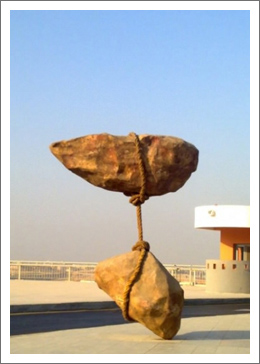•
the Blog
On PhD advisory committees
By Guillaume Filion, filed under
motivation,
PhD.
• 08 February 2023 •

Joana, year 1
Joana is quite tense, she smiles a little too much. She brought some cookies for the committee, which I find very nice. I eat a cookie and thank her for the attention. I hope it helps her relax. A few minutes later, the chair of the committee thanks everybody for coming and goes through the protocol: Joana will give a forty minute presentation of her work, then we will discuss her project together, then she will leave the room so that we can speak with her adviser in private, and finally she will come back into the room without her adviser so that we can speak with her in private. “You can start whenever you are ready Joana” says the chair. Joana breathes deeply and she starts.
It is the middle of the presentation. Joana is still answering the question of the chair. Her answer does not make sense to me but I nod reassuringly. I am curious as to whether her adviser will correct her. I met him at a congress but I do not know his supervision style.
“What Joana meant to say is that...”
“A protective micromanager” I think to myself. This...
How to teach yourself math
By Guillaume Filion, filed under
mathematics,
motivation,
learning.
• 03 May 2021 •
 I recently left Barcelona after spending nearly nine years in the company of wonderful people who supported me and helped me carry forward my teaching and my research. At a goodbye dinner, I was surprised that a friend insisted that I should explain how I learned math, that it would be useful and inspirational.
I recently left Barcelona after spending nearly nine years in the company of wonderful people who supported me and helped me carry forward my teaching and my research. At a goodbye dinner, I was surprised that a friend insisted that I should explain how I learned math, that it would be useful and inspirational.
I had never thought about it. I guess what he meant is that I should explain why formal computational approaches are so important for me, given that I do not have any diploma in mathematics or statistics.
Doing the math
I have been doing one hour of math every day for 23 years. I will get to the how, but for now I want to discuss the why. Sticking to this schedule rigorously means that you do 365 hours of math every year. At the time I studied (in biology), you had to take ~500 hours of class per year for three years in order to graduate, so it was considered that you reach the graduate level after you study ~1500 hours. With one hour per day, it will take you a little more than four years.
At the graduate level, we had about...
Three lessons from peer coaching
By Guillaume Filion, filed under
motivation,
management,
coaching,
leadership.
• 09 January 2017 •
 For a little more than a year, my colleagues and me have been organizing peer coaching sessions for junior group leaders. A typical session consists of four to six of us, and we meet for one morning to discuss the most pressing issues. After a start-up training and some trial and error, we settled for a group coaching method that gave the best result. To give an idea, the “coachee” tells the chairman what he/she wants to solve, then follows a discussion where he/she explains the facts to the coaches who ask as many question as possible. Then the coaches analyze the situation, suggest solutions and make comments meanwhile the coachee has to remain silent and listen. Finally, the coachee summarizes what he/she heard and what steps he/she will take.
For a little more than a year, my colleagues and me have been organizing peer coaching sessions for junior group leaders. A typical session consists of four to six of us, and we meet for one morning to discuss the most pressing issues. After a start-up training and some trial and error, we settled for a group coaching method that gave the best result. To give an idea, the “coachee” tells the chairman what he/she wants to solve, then follows a discussion where he/she explains the facts to the coaches who ask as many question as possible. Then the coaches analyze the situation, suggest solutions and make comments meanwhile the coachee has to remain silent and listen. Finally, the coachee summarizes what he/she heard and what steps he/she will take.
With this exercise, we learned a great deal about how to organize such peer coaching sessions in the academia and how to make the best of them, but this is not what this post is about. Instead, I would like to share more important lessons I have learned about working together and using the group as support and source of motivation.
If you...
How to teach research?
By Guillaume Filion, filed under
motivation,
management,
leadership.
• 28 February 2016 •
 One of my students once asked me how to become a better researcher. “Great question!” I thought. Instead of a straight and clear answer, I heard myself babbling, as happens when you have no idea what you are talking about. Somewhat disappointed by my non answer, I turned to my colleagues and asked how they teach research. The answer ranged from embarrassed silence to politely switching topic. Strange, I thought, it is our responsibility as principal investigators to educate the junior researchers of our group, so we’d better have some idea of what we are doing.
One of my students once asked me how to become a better researcher. “Great question!” I thought. Instead of a straight and clear answer, I heard myself babbling, as happens when you have no idea what you are talking about. Somewhat disappointed by my non answer, I turned to my colleagues and asked how they teach research. The answer ranged from embarrassed silence to politely switching topic. Strange, I thought, it is our responsibility as principal investigators to educate the junior researchers of our group, so we’d better have some idea of what we are doing.
We have a fairly good idea of how to teach skills, like mathematics, molecular biology etc. But I would argue that research is not a skill. I would argue that it is an attitude. So the real question is how to teach an attitude. There is no foolproof recipe, but here goes a subjective view that I gathered from reading, from discussions and from personal experience.
1. Motivate the change
Most students and junior scientists enter the lab with an open mind, ready to learn as many new things as possible. But most of them focus on learning technical skills (at...
Four illusions
By Guillaume Filion, filed under
motivation,
management,
illusions,
leadership.
• 28 February 2014 •
 Optical illusions come in two flavors. The one shown on the left is a classical example of a “false” perception. It looks like the grey lines are curved, but they are actually perfectly horizontal. Even if we know that the lines are horizontal, we cannot force ourselves to see them this way. I find it somewhat of a miracle that reason is strong enough to tell that the eyes are lying, but still, however long you stare at the picture, you will never see it the right way. The brain cannot learn to see this picture.
Optical illusions come in two flavors. The one shown on the left is a classical example of a “false” perception. It looks like the grey lines are curved, but they are actually perfectly horizontal. Even if we know that the lines are horizontal, we cannot force ourselves to see them this way. I find it somewhat of a miracle that reason is strong enough to tell that the eyes are lying, but still, however long you stare at the picture, you will never see it the right way. The brain cannot learn to see this picture.
 The second flavor of optical illusions is shown on the right. This picture may either represent the face of a woman, or a saxophone player. Most people immediately see one of those, and it may take them some time to see the other. But once they see it, there is no way to “unsee” it. The brain has completely forgotten how it feels to not see it and cannot unlearn to see the picture.
The second flavor of optical illusions is shown on the right. This picture may either represent the face of a woman, or a saxophone player. Most people immediately see one of those, and it may take them some time to see the other. But once they see it, there is no way to “unsee” it. The brain has completely forgotten how it feels to not see it and cannot unlearn to see the picture.
Vision is not the only sense that can be fooled. As a matter of fact, what is so special about optical illusions is that we realize that something...
So you want to be a group leader
By Guillaume Filion, filed under
motivation,
management,
leadership.
• 21 January 2014 •
People often ask me whether it is difficult to be a group leader. I usually answer “No that’s easy. Being a good group leader... that’s another story.” It is one of these jobs for which there is no training. It is also one of these jobs about which there is no information. As the leader of a team of scientists, you will have to face your problems alone, because scientific leadership is...
The best kept secret in the world
 The need for solid leadership skills is fully acknowledged in the civilized world, but in academic research this culture is lagging behind. So far behind that we have to admit the plain truth: leadership in science is a taboo. Understandably, academic researchers are reluctant to share their experience because they have little authority to do so, and because the information is often confidential. I could tell how I solved “the case of a post-doc of mine who put his music too loud in the lab”, but since all my colleagues would identify this person, I would end up with a serious issue in my team.
The need for solid leadership skills is fully acknowledged in the civilized world, but in academic research this culture is lagging behind. So far behind that we have to admit the plain truth: leadership in science is a taboo. Understandably, academic researchers are reluctant to share their experience because they have little authority to do so, and because the information is often confidential. I could tell how I solved “the case of a post-doc of mine who put his music too loud in the lab”, but since all my colleagues would identify this person, I would end up with a serious issue in my team.
There are also systemic reasons for this lack of culture. Academic...
How to stop sucking and be awesome instead
By Guillaume Filion, filed under
motivation,
PhD.
• 08 June 2013 •
I recently gave a motivation speech at the CRG/Institut Curie international PhD retreat. There was only one slide and the content was fairly general, so I thought I could reproduce it here. My goal was to motivate people, but also to surprise them a little, especially at the end. Finally, I wish such a nice title were mine, but I have to acknowledge Jeff Atwood. I stole it from his post on Coding Horror (which I also invite you to read).
How to stop sucking and be awesome instead
Think about what we can do today. We can send people on the moon. We can talk to each other any time anywhere on the planet. We can go anywhere in about a day. We can transplant a heart. We can cure diseases that were fatal only 30 years ago. And yet, there is still one thing that we cannot do. We don’t know how to motivate people.
That’s right, we do not know how to make our colleagues enthusiastic about their work. If you watch a couple of TED videos or if you read a couple of books on management, you will see that we...
I’m the boss!!
By Guillaume Filion, filed under
motivation,
journals,
dialogue.
• 08 March 2012 •
“You know how scientists will communicate in the future, don’t you?”
“Of course I do!”
It is a shameless lie, I have no clue what Frédéric has in mind, but I don’t want to look stupid.
“And you Vincent, I bet you know it too... right?”
On this afternoon of 2004, somewhere on the south coast of Madagascar, Vincent gives one of his majestic puzzled looks. That was exactly what Frédéric had hoped for.
“Well, in the future, scientists will no longer publish in journals. They will have public lab notes. They will post their results on their personal Internet page, day by day... like a blog. Peer scientists will be allowed to leave their comments, criticize the protocols and the results. In short, the information will go directly from the producers to the consumers, and it will spread much better because science will become open source.”
I believed it then.
But now, I just became an independent researcher. I have my own team. I am the boss!! And I realize that Frédéric was wrong. To stay in research you need a good track record. And as far as track...

